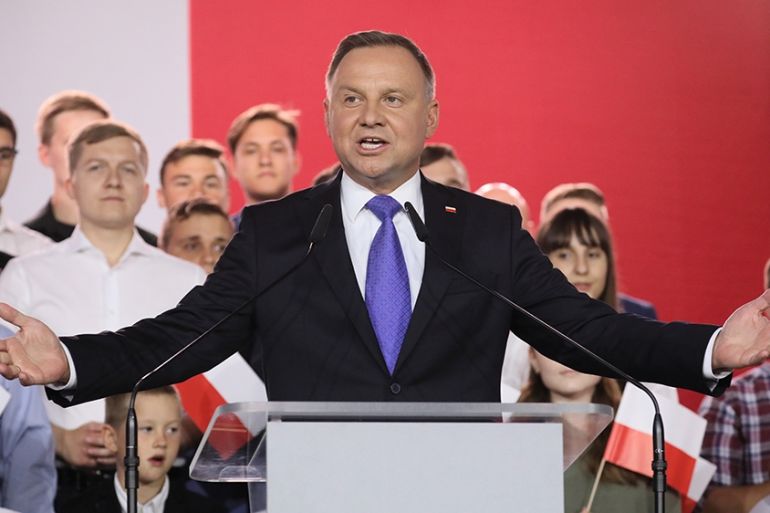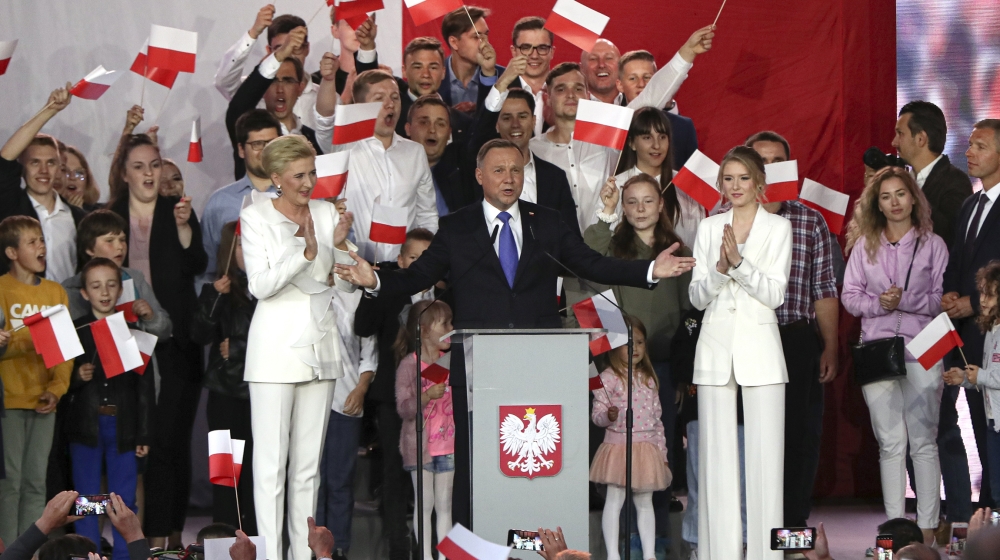Poland’s incumbent Andrzej Duda narrowly wins presidential vote
Election commission says Duda secured 51.2 percent of vote in runoff election while rival Trzaskowski won 48.8 percent.

Andrzej Duda, Poland’s conservative, populist incumbent, has narrowly won the presidential election, results from over 99 percent of polling stations show.
The remaining uncounted votes are unlikely to sway the final outcome, the National Electoral Commission said on Monday, a result that reflects the deep divisions within the European Union nation.
Keep reading
list of 4 itemsSouth Africa’s Ramaphosa signs health bill weeks before election
As South Africa votes, Zimbabwean migrants, smugglers anxious about future
‘As someone with Palestinian heritage, I couldn’t stay in the Labour Party’
Duda, who is backed by the ruling right-wing Law and Justice party (PiS), won 51.21 percent of the vote, while opposition candidate, liberal Warsaw Mayor Rafal Trzaskowski, got 48.79 percent.
Voter turnout was a record high at 68.12 percent, the election commission said.
Duda had campaigned on traditional values and social spending in the mostly Catholic country as he fought for a second five-year term. His victory could have profound implications for Poland’s relationship with the EU.
Trzaskowski, a former European Parliament lawmaker who joined the race relatively late, opposes Duda’s denigration of urban liberals, the LGBTQ community and other minorities, and aims to counter an erosion of democratic rights under the ruling party. He represented the centrist opposition Civic Platform party that was in power in from 2007 to 2015.

“All we need is to count the votes. The night will be tense, but I am certain that when the votes are counted, we will win,” Trzaskowski told supporters in a park outside Warsaw’s old town just after the exit poll.
Social discord
Duda’s re-election would open up the prospect of three years of uninterrupted rule by PiS, which won control of the lower house in 2015. A win for Trzaskowski would give him the power to veto laws passed by the ruling conservatives and give Poland a less contentious relationship with the EU. The next national election is not due until 2023.
The State Electoral Commission said the turnout by 5pm (15:00 GMT) was 52.1 percent, more than four points higher than at the same time in the first round of voting on June 28 when Duda got 43.5 percent support and Trzaskowski 30.5 percent.
The ballot was supposed to be held in May, but after much political wrangling was delayed by health concerns amid the coronavirus pandemic. Some 30 million voters are eligible to cast ballots.
People waited in long queues at voting stations across the country, especially in seaside resorts where many Poles were on holiday.
“We should vote because otherwise, we have no right to complain about our politics,” said Eugeniusz Kowalski, 67, a retired office clerk, after he had cast his ballot in Warsaw.
|
|
“We could use some change,” he added.
The head of Poland’s influential Roman Catholic Church, Archbishop Wojciech Polak, said the new president should take a conciliatory approach.
“In the situation when we see constant discord, divisions, the rift in society, let him be a unifying one, the president of all Poles,” Polak said after voting in Gniezno.
Duda voted in his hometown of Krakow while Trzaskowski voted in his wife’s southern hometown of Rybnik.
“This is a civic duty, but also a privilege because this is a very important election,” Trzaskowski said after voting. “I hope the turnout will really be high.”
EU strains
The governing party and Duda have won popularity through a welfare programme that improved the lives of many impoverished families with children and retirees, especially in rural areas and small towns, and also through their championing of Poland’s traditional Roman Catholic values.
But the governing party has drawn criticism from EU leaders for taking steps to politically influence the justice system and the media in Poland. It has also deepened social rifts with verbal attacks on urban liberals and LGBTQ people.

Trzaskowski has promised to close social rifts and to continue the benefits policy. His support is strongest in larger cities and among more highly educated people.
Due to the pandemic, voting was held under strict sanitary regulations. Poland has registered more than 37,000 cases of COVID-19 and almost 1,600 deaths.